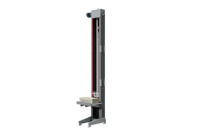Are Wood Pallets Damaging your Product?

Since the 1940s, wood pallets have been a staple of material handling, allowing for faster loading and unloading in combination with a forklift. However, the food industry has become cautious of wood pallets, and many manufacturers have switched them out in favor of plastic ones. Read on to learn why.
The dangers of wood pallets
While wood pallets have their advantages, many people agree that they don’t have a place in the food industry. According to ABC News, this is because dangerous bacteria like E. coli, Listeria and Salmonella can grow in the wood. As ABC reports, 43% of wood pallets tested show positive traces of these bacteria.
If these bacteria get into the food supply, it could lead to numerous food poisoning cases. Not only is that bad news for the customers who fall ill, but it can also mean a damaged reputation and lost money in lawsuits for the manufacturer or company managing the food chain.
It’s also believed that chemicals used to treat the wood pallets can break down and get into the food supply. That’s not to mention that if the pallets get wet, they’re more likely to grow mold than other materials because of their porous nature. Plus, they provide an optimum environment for harboring bugs that could find their way into the food products.
The alternative
Wood pallets provide an environment where dangerous bacteria can easily grow since the material is organic and porous. Plastic pallets, on the other hand, are less bacteria-friendly. If used in warehouses as an alternative to wood pallets, they can reduce the risk of food poisoning outbreaks.
However, there are many criticisms to plastic pallets. For one, they’re not easy to repair or recycle. Plus, they’re more expensive and aren’t even as stiff. Another concern is that while they are easy to clean at the beginning, they can easily become a host for bacteria as they acquire nicks and scratches. Eventually, they’ll become tougher to clean, making it easier for colonies of bacteria to grow inside the scratched surfaces.
But again, the benefits can come in handy. For example, plastic pallets have a longer shelf life than wood pallets, meaning that you won’t have to replace them as often.
Concerns
While all this information makes it sound like plastic pallets are the way to go in the food industry, there are several concerns worth considering before deciding to switch.
Among these concerns, some operators wonder if certain wood pallets are being targeted for study. Are the dirtiest ones getting the most attention in an effort to skew the results?
Another concern is that the flame-retardant materials used in plastic wood pallets may be harmful to the environment. So, is it a matter of choosing the lesser of two evils? Perhaps, but at the same time, it’s important to note that wood pallets are made with harmful chemicals as well, including a formaldehyde compound.
On a personal level, it’s also concerning to adopt plastic pallets if your company works on an open-loop system where you’re sending pallets to other businesses. You wouldn’t want to spend three times as much on a pallet only to watch it drive away in a truck, which is why plastic pallets are generally seen in closed business systems.
Considering how often pallets are used, there are few illness outbreaks in comparison, so it’s unlikely there will be a pallet crisis anytime soon. However, take precautions to protect your product and ensure the safety of your customers and reputation. Start by implementing a plan to maintain clean pallets, and then discuss pallet options with your company to decide which material is best for the safe and efficient delivery of your product.
Looking for a reprint of this article?
From high-res PDFs to custom plaques, order your copy today!






